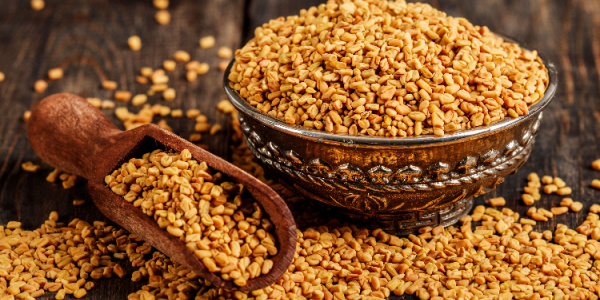Fenugreek, scientifically categorized as Trigonella foenum-graecum, is a plant native to Greece, other Mediterranean nations, the Middle East and portions of Southeast Asia. The seeds of this herb have been commonly used as a spice for specific food preparations, have been featured as a prominent ingredient in various nutritional supplements. Both the leaves and seeds of the fenugreek plant are used as an herb, though the seeds are more common for culinary purposes.
How Aging Men Benefit from Fenugreek
Fenugreek has been used for medicinal purposes by numerous civilizations for centuries. Fenugreek is believed to benefit men’s health in many ways. The plant is an excellent way for helping to maintain balanced testosterone levels, but it has other positve health effects as well.
Increasing Testosterone Levels
Low testosterone (andropause) is a natural part, when men age. Should the problem become severe enough, a number of bothersome, if not life-disturbing manifestations might occur. Though research is still ongoing and not entirely conclusive on the subject, there are those in the scientific community who believe that fenugreek might help boost bodily production of testosterone, the chief male sexual and reproductive hormone.
In one study, giving fenugreek extract to 50 male volunteers for a period of 12 weeks increased free testosterone levels by up to 46 percent. The benefits were seen in a full 90 percent of the participants. The higher testosterone levels were also reflected in increased sperm count for 85.4 percent of the men, plus improvements in libido, cardiovascular health, mental alertness and mood.
Another study on the link between fenugreek and testosterone looked at 60 Australian men who were administered fenugreek extract for six weeks. At the end of the six weeks, libido increased by an average of 28 percent. Men who received placebo did not experience any change in their sex drive. These types of effects that can be seen with Fenugreek are thought to be due to the beneficial compounds known as saponins that are present in the herb. Saponins can also carry other health benefits like improving your immune system and reducing oxidative damage to your cells.
Improving Digestion
Helping Against Heartburn
Fenugreek possesses soothing properties that have been proven effective in helping heartburn sufferers ease the associated symptoms. Heartburn occurs when stomach acid backs up into the esophagus. The most common manifestations those stricken with this condition experience is a burning sensation in the chest or throat that frequently occurs at night when said individual is lying down. Scientists opine that fenugreek can help coat the esophagus. This coating provides protection against caustic digestive acid.
Promoting Healthy Blood Sugar Levels
Fenugreek seeds are comprised of compounds like fiber, which have been known to decrease the body’s digestion rate. Such an event may enable the digestive tract to absorb nutrients such as sugar and carbohydrates with greater efficiency. The end result could be lower blood sugar levels and possible protection against diabetes or helping to maintain healthy blood glucose levels in already stricken individuals.
Ensures Healthy Cholesterol Levels
Fenugreek seeds contain substances thought to help maintain healthy bodily concentrations of cholesterol. Not only do the herb’s seed extracts improve the digestive tract’s ability to absorb cholesterol before the potentially harmful substance enters the bloodstream but also may inhibit the liver’s ability to produce excess levels of cholesterol. In addition, some scientific studies have concluded that fenugreek contributes to a decrease in blood counts of “bad” cholesterol.
Protecting Against Inflammation
Certain medical professionals opine that fenugreek may help to modulate bodily inflammation. Inflammation is often the culprit of many physical injuries. However, inflammation may also occur internally. Should internal organs be subjected to inflammation for extended periods, impacted individuals might be susceptible to contracting serious illnesses such as autoimmune disorders and various types of cancer.
Increasing Exercise Performance
Sports nutritionists who have studied athletes have reported that those who include fenugreek in their diets may experienced an increase in strength and flexibility.
Enhancing Libido
A positive side effect of fenugreek’s purported testosterone-stimulating abilities is enhanced libido. This is especially true in men suffering from libido-related sexual performance or desire issues. In 2011, a study published in a scientific journal chronicled roughly 60 men stricken with some type of sexual problem. A certain percentage of these individuals were administered fenugreek. Not long after the study began, many test subjects noticed a significant improvement in concerns like erectile dysfunction and lack of sexual desire.
Though fenugreek contains numerous healthy substances and may help improve a man’s overall lifestyle, physicians recommend using the product safely. Therefore, it is advisable to seek medical advice prior to use to determine the exact dosage that will provide the best possible efficacy.







